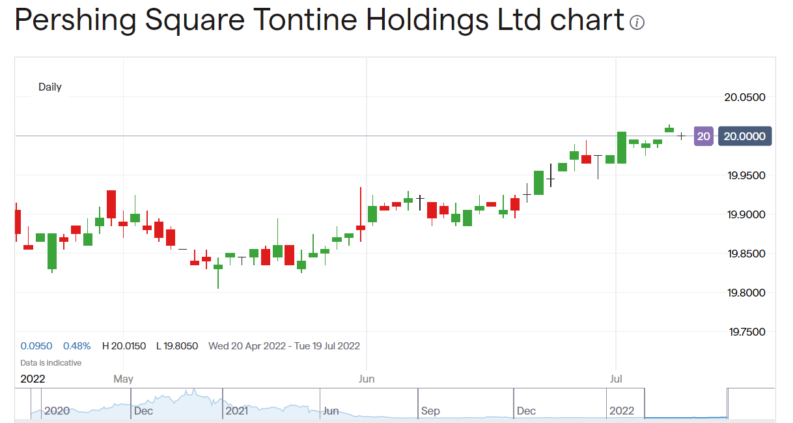Key points:
- Pershing Square Tontine is to redeem itself at its cash value
- It seems they just couldn't find a worthy merger candidate in time
- Does this mean the SPAC boom is over?
Pershing Square Tontine (NYSE: PSTH) stock is to be redeemed which is what has driven the stock back up to its redemption price following those many months when it traded below it. One lesson from which is that, contrary to the early days of SPAC deals, the hope of doing a deal is actually a money loser, not gainer. The absence of a deal being done returns the PSTH stock price to the strict cash value that is. This is a substantial commentary on the SPAC revolution.
Pershing Square was of course not going to be short of companies that it could take to about taking them public via a SPAC merger. We might think a little about the use of the word tontine, which has significant historical overtones – murders were committed to win one more than once. There is though a less drastic financial markets meaning.
But the bigger point to be made here is not simply that Pershing Square Tontine is going to wrap up and go home but the implication of this for the wider SPAC market. If someone like Pershing cannot identify a deal that's worth doing – which is worth more than the cash already raised – then the entire tactic, if you prefer strategy, of a SPAC gets called into question.

Also read: Event Driven Investing – Special Situations.
The entire logic of the SPecial Acquisition Company phenomenon is that there is some large class of currently private companies which are worthy of going public and also dissuaded by the costs and regulation of the traditional IPO process. That there are some – or were some – was almost certainly true just because there always are. But then there were hundreds of SPACs created and many handfuls of them went on to produce those mergers which introduced a business to the public markets. Not all of which have done that well.
We could therefore say that SPACs are rather like new ways of lending money. The great truth of banking being not that there's a shortage of funds to lend, nor even a shortage of ways to lend. The shortage is of people worth lending to. So with companies on public stock exchanges. What if the shortage is actually of companies worth being floated? That's the one problem that the SPAC system doesn't solve.
We might even suggest that if someone like Pershing Square can't find someone worth bringing to market, despite the SPAC already being funded, then that's the proof of that contention. The shortage is of companies worth merging with, not of SPACs to merge into.
What this means, assuming that the contention is correct, is that we could think of the SPAC boom as being rather over. That means no overhyped arrivals on the market, true, but also provides a possible trading strategy. Which other funded SPACs are currently trading below their cash balance and so might rise in value of they were to redeem? There's obviously some speculation in identifying who those might be but it could be research that pays dividends.
